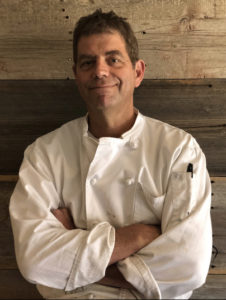
Ask Chef Bryan Carr what his concept was when he and wife, Diane, first opened their popular Clayton eatery, avenue – yes, spelled with a lowercase a – and the answer will likely surprise you.
“I don’t know if we had a concept,” said Carr, who opened avenue nearly seven years after transitioning from his first Clayton restaurant, pomme café, both eateries that embraced a straightforward approach to food. “As far as cooking is concerned, we try to do as little as possible to manipulate the foods.”
It’s a style that reflects Chef Carr’s personal style and classical French culinary training. His culinary tutelage included famed French chefs, such as Hubert Keller and others in San Francisco and Napa Valley.
“My training with classical French cooks is not only about learning technique, but also perspective. Learning that it’s not about you. The chef is the least important person in the room,” Carr said. “I think the best chefs are invisible; those who don’t call attention to themselves, and shift the attention to the menu and the ingredients; keeping it simple; letting the ingredients speak.”
It’s a given that good food and cooking always revolve around good ingredients as does cooking seasonally. However, as Carr explained, a menu also has to make sense.
“We change the menu when it makes sense. There’s no rule or formula for it,” he said. “For example, in the cold winter months, we run a classic French onion soup au gratin. Normally we switched to gazpacho at the beginning of May – except this May when it was still pretty cool, we kept the onion soup for a little while longer. That’s an example of a menu that makes sense.”
In today’s world the concept of cooking fresh needs to be reexamined, because fresh and locally grown doesn’t necessarily mean an ingredient is the best. With that said, consider winter strawberries or winter citrus that’s sold in the summer. Seasonality, the traditional seasons and places where these foods are produced have become blurred.
“You can find almost anything on the market whenever you want. It may not be any good, but you can find it,” Carr said. “Right now, basil, tomato and the cod are very beautiful.”
Carr’s menu at avenue, like its name spelled with a lowercase “a,” isn’t pretentious.

Homemade soups and ice cream shine as brightly as the quiche and turkey sandwich on the lunch menu.
“The turkey sandwich has been on the menu for years because it just works,” Carr said, as he explained the challenges of being a good cook. “It’s really demanding of a cook to do the same thing over and over and achieve the same results. That’s when the real disincline of cooking shows up. If you’re innovating, there’s no standards.”
Carr’s French training taught him to embrace the simple flavors ingredients can offer – case in point, a simple salad, an item that is often disappointing.
“I quietly make a big deal out of something like a mixed green salad. To make a good salad begins partly with what you don’t do,” he said. “You can buy a box of mixed lettuces – and there’s nothing wrong with that – but it’s the same salad whether you’re here, there or there. We have a salad that’s different. When we make salad, we’re washing and drying heads of lettuce, adding fresh herbs, then the vinaigrette, which is very important because you have to use the right vinegar. I always tell people not to buy their vinegar at the grocery store. Buy it at a wine store. I’m not talking about something esoteric or exotic, I’m just talking about good vinegar and good salt. Salt is foundational.”

Carr is quick to emphasize he wasn’t inventing anything. Instead, he said cooking is all about integrity, referencing the philosophy of the late, great French chef, Paul Bocuse who wrote, “If you give the best cook in the world second-rate ingredients, the best he’ll be able to achieve is second-rate food.”
After decades as a successful chef and restaurateur Carr has his own philosophy to share.
“It’s not about the chef. The ‘look at me, look at me’ stuff clutters things up and gets in the way. And this isn’t a culinary temple. This is a place where you can go for conversation and get a reliable meal. There’s comfort in that. I was at a terrific restaurant in Chicago, and the food and service was spot on, the wine list was good, but I hated being there because there was zero comfort. The place has to be comfortable. If the place is loud, and you feel like you’re being grabbed by the lapels and told ‘look at me look at me,’ it’s not comfortable. Don’t get me wrong – those places are marvelous at what they do, but it’s not what we do.”
To aspiring restaurateurs and chefs coming up in the business, Carr offered two pieces of advice: “If the experience or food has to be explained, you’re doing it wrong. And if you get good ingredients and keep your knife sharp and are honest, you’ll be fine.”
